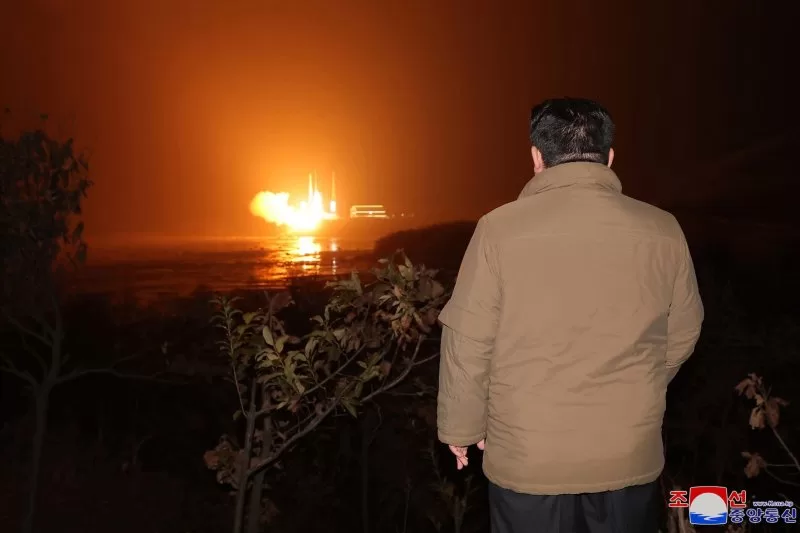A photo released by the official North Korean Central News Agency on November 22, 2023, shows North Korean leader Kim Jong Un overseeing the launch of a new-type carrier rocket ‘Chollima-1’ carrying the reconnaissance satellite ‘Malligyong-1’ at the Sohae Satellite Launching Ground in Cholsan County, North Phyongan Province, North Korea. A panel of experts in Seoul on Friday said the path to a denuclearized North Korea is through reunification. File KCNA/EPA-EFE
Sept. 27 (UPI) — The path to a denuclearized North Korea is through unification, according to a panel of peninsula policy experts.
Meeting in Seoul on Friday for the three-day International Forum on One Korea in Seoul, hosted by the Global Peace Foundation, a group of international experts discussed the potential for achieving a unified Korea.
David Maxwell, retired U.S. Army Special Forces colonel and Northeast Asian Security Affairs expert, began his speech by saying that the next U.S. president needs to adopt “a radical new North Korean policy,” calling for a shift from focusing on denuclearization to reunification of the Korean Peninsula.
“The only way to achieve a denuclearized Korean Peninsula,” Maxwell, the vice president of the Center for Asia Pacific Strategy and a senior fellow at the Global Peace Foundation, said, “is through unification — a unification that is led by the Korean people and supported by the international community.”
In Seoul for the three-day event, he added that though the previous approach over the last several decades of seeking denuclearization has produced little to no results while essentially ignoring the ultimate goal of reunification.
“For too long, our policies have focused on military deterrence, sanctions and diplomatic engagement. These are important, but they overlook a crucial element: a human rights upfront approach and the pursuit of a free and unified Korea,” he said.
Maxwell was quick to reaffirm his support of deterrence, pointing out that there have been recent successes in this regard, including the August 2023 security pacts signed by the leaders of the United States, South Korea and Japan, which express their countries’ support of “a unified Korean Peninsula that is free and at peace.”
Maxwell, a former military planner, said: “I would take those words of our presidents as something we should accomplish.”
And he added that though the task before them is daunting the current moment presents an opportunity to pursue unification from a human rights perspective.
North Korean leader Kim Jong Un‘s abandonment this summer of unification as the nation’s goal, and turning ultimate blame on South Korea for its citizens’ suffering, has removed hope from those living in the North.
Now, Maxwell said, is the time for the United States and Japan, as well as civil society, to support South Korean President Yoon Suk-yeol’s so-called 8.15 Unification Doctrine, he said.
“Our approach must prioritize human rights,” he said, stating that it is through Kim’s deprivation of human rights that he controls the North Korean people. “This is why our strategy must be built on exposing these abuses, on educating the Korean people in the North on their universal and unalienable human rights and empowering them to seek change.”
Kim Baek-san, president of the Global Peace Institute, similarly declared that the route to a denuclearized North Korea is a unified peninsula.
He said the previous decades-long pursuit of denuclearization has not worked and they cannot continue to make the same mistakes of its past.
Regime change in the North is needed, he said.
“Unless we change the regime itself, we cannot deal with the nuclear issue of North Korea. It’s about the system. It’s about human rights. It’s about freedom. It’s about the economy,” he said. “So we have to take a comprehensive approach to deal with all that matters; that should be our approach toward the nuclear issue in North Korea.”
A consensus on what reunification means needs to be established, he said, while suggesting Global Peace Foundation founder and chairman Hyun Jin Preston Moon’s vision for unification, known as the Korean Dream.
“The vision is first and foremost,” he said. “If we have a consensus on the vision … and then it will lead to unification itself.”
Lee Sung-yoon, a global fellow at the Woodrow Wilson International Center for Scholars, added that the goal of unification is not simply about fulfilling a philosophical idea, but needed to save lives.
North Korea was richer than South Korea until the early 1970s and is the only urbanized, industrialized country to experience famine in peacetime, he said, referring to the famine of the early 1990s that killed millions of North Koreans.
Seoul, he said, has the “moral obligation” to inform its own people as well as the North Koreans and the people of the wider world of this “inhuman policy of mass starvation,” he said.
They need to educate the North Korean people on the root cause of their prolonged hunger and that once unification is affected, overnight they will have the basic, universal rights to food, housing and life.
“Lives will be saved,” he added.
He said those on the left of the political spectrum have been preaching the right to express and freedom of speech, but Lee was frank when he said during the panel that these are not important. They need to be given food, he said.
“Liberation and unification are not just esoteric dreams,” he said. “They will save lives.”

